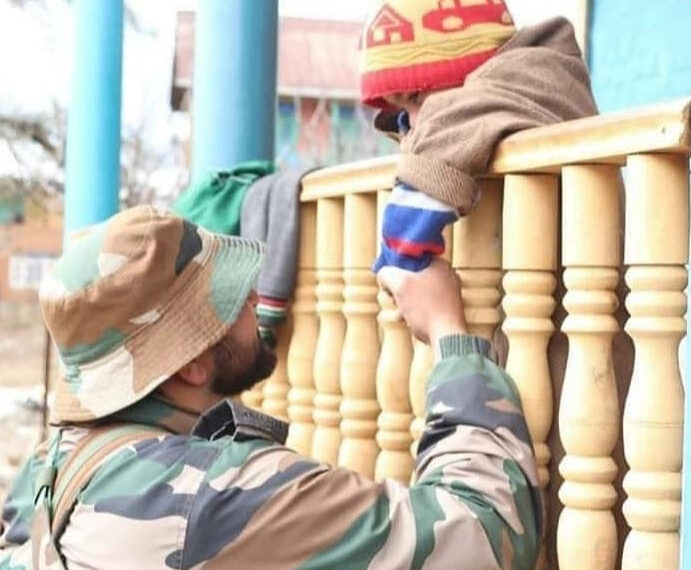The Indian Army’s presence in the Kashmir region has long been a subject of intense debate and scrutiny. Amidst the political complexities and the challenges posed by militancy, one aspect that often gets overlooked is the relationship between the Indian Army and the Kashmiri citizens, framed within the concept of “Humsaya,” an Urdu term meaning neighbor. This essay explores the multifaceted role of the Indian Army as a humsaya to the people of Kashmir, focusing on their contributions to security, development, and humanitarian efforts.
The Indian Army has been stationed in Jammu and Kashmir since the partition of India in 1947, which led to the first of several conflicts between India and Pakistan over the region. The subsequent decades saw the rise of insurgency and cross-border terrorism, necessitating a significant military presence to maintain order and security. While the primary mandate of the Army has been to counter these threats, their role has extended beyond mere military engagement. Security is the most visible aspect of the Indian Army’s presence in Kashmir. Amid ongoing insurgency and frequent cross-border shelling, the Army’s efforts in maintaining peace and safeguarding the lives of civilians are crucial. Operations such as “Operation All Out” are aimed at neutralizing militants, which, despite controversies, contribute to a more secure environment for the local populace. Checkpoints, patrols, and counter-insurgency operations are routine, but they are essential in ensuring that militant activities are kept in check, thereby protecting the local population from violence and coercion.
Beyond their primary role of providing security, the Indian Army has also been instrumental in developmental projects aimed at improving the lives of Kashmiri citizens. Initiatives like the Sadbhavana Project have seen the Army engage in a variety of activities to build infrastructure, enhance education, and provide healthcare. These projects include the construction of schools, bridges, and roads in remote areas, which not only facilitate better connectivity but also foster a sense of normalcy and progress in the region.
The Army Goodwill Schools are a prime example of such efforts. These schools provide quality education to children in remote and conflict-affected areas, aiming to uplift the local youth and provide them with better opportunities. Additionally, the Army conducts medical camps and blood donation drives, ensuring that healthcare services reach even the most inaccessible regions.
In times of natural disasters and emergencies, the Indian Army has consistently played a crucial humanitarian role. During the devastating floods in Kashmir in 2014, the Army was at the forefront of rescue and relief operations. They provided food, shelter, and medical aid to thousands of affected people, reinforcing their role as a reliable and caring neighbor.
Moreover, the Army’s efforts in community engagement are designed to bridge the gap between the military and civilians. Programs that involve youth engagement, sports activities, and vocational training aim to build trust and mutual respect. These initiatives help in reducing the alienation and resentment that might exist due to the prolonged military presence.
Despite these positive contributions, the Indian Army’s role in Kashmir is not without its challenges and criticisms. Incidents of alleged human rights violations and the imposition of the Armed Forces Special Powers Act have led to strained relations between the Army and the local population. The balance between security measures and civil liberties remains a delicate one, and instances of excess force have often resulted in public outrage and international criticism.
The Indian Army’s role as a humsaya to the Kashmiri citizens is a complex and evolving one. While their presence is primarily driven by security imperatives, their contributions to development and humanitarian assistance significantly impact the daily lives of the people in the region. By fostering a relationship based on mutual trust and support, the Army can continue to play a positive role in the socio-economic upliftment of Kashmir. However, addressing the grievances of the local populace and ensuring that their rights are respected will be crucial in strengthening this relationship. As a humsaya, the Indian Army has the potential to not only protect but also nurture the aspirations of the Kashmiri people, contributing to lasting peace and prosperity in the region.


